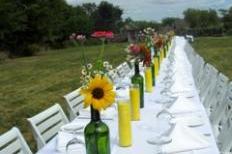






 Good Food Garden PartyAs the sun sank in the sky over a dinner table seating 160 at Troy Gardens, twinkling candlelight provided appropriate lighting for the quiet revolution stirring beneath the meal, utensils, and the gardens in the background.
Good Food Garden PartyAs the sun sank in the sky over a dinner table seating 160 at Troy Gardens, twinkling candlelight provided appropriate lighting for the quiet revolution stirring beneath the meal, utensils, and the gardens in the background.
From the source of the dinner’s ingredients to the trash heap at the end, the fundraiser for Community GroundWorks on Sept. 8 attempted to live up to its tagline: “no waste,” an idea gaining traction as innovators find new ways to achieve it without sacrificing elegance.
Indeed, the Good Food Garden Party was well-adorned with flowers, candles and delectable entrées, bringing in about 20 thousand dollars for educational programming at Community GroundWorks, partly operated out of Troy Gardens. And at the same time, Community GroundWorks Executive Director Jill Jacklitz said their goal was to leave as small an environmental footprint as possible – beginning with the creation of the meal.
Volunteer chefs from restaurants including L’Etoile, The Coopers Tavern, and Weary Traveler Freehouse heeded the call, developing dishes with ingredients sourced from Troy Gardens and other local farms. That cut down on wastes associated with transportation, storage, and processing of food.
“We really value connecting people to nature and local food,” Jacklitz said.
On the other side of the equation, Community GroundWorks wanted to curb trash. For this, they turned to Purple Cow Organics.
“It isn’t waste until you waste it,” said Steve Stumbras, director of sales and solutions at Purple Cow, reciting the company motto. “There’s all kinds of statistics that show how much material, especially organic material, goes into the landfill, and there’s just a better use for it.”
According to the Environmental Protection Agency, Americans discarded more than 33 tons of food in 2010, making it the greatest contributor to municipal solid waste that goes to landfills and incinerators, where it becomes a source of the greenhouse gas methane.
At the dinner party, compost provided an alternative use for traditional waste. By bringing in compostable plates, cups, utensils and napkins, all of the place settings became fodder for soil, along with leftover food. Stumbras collected these materials, which his company will compost and use to create turf for a variety of purposes, like residential lawns or athletic fields.
Purple Cow provided their services for free, partly because Community GroundWorks has used compost from Purple Cow in the Troy Gardens.
“The reason why an event like this is so meaningful, is some of the vegetables in the meal are grown in that media that we provide,” Stumbras said. “You have some of the city’s best chefs preparing meals from that garden. And those residuals are turned back into a premium quality growing media.”
The Community GroundWorks event isn’t the only of its kind. Stumbras said he has two more events at farms on the horizon. Purple Cow also has a program to help businesses reduce their waste, which has drawn the likes of Whole Foods, through which they train employees to sort out compostable items and then collect them. Stumbras said it’s becoming more popular.
“There are a number of businesses throughout Dane county that are putting their heads together and trying to bring these kinds of initiatives to their offices and corporations, and we’re always willing to see what we can do to help them achieve their goals,” Stumbras said.
|
|
|
Welcome to the Madison Commons, a website designed to provide news and information about all of Madison's neighborhoods and a crossroads for the discussion of community issues. The name comes from the idea of a village commons, a place for news, talk, debate, and some entertainment, too, that's open to everyone.
All rights reserved. Read more about the Madison Commons and its partners.

